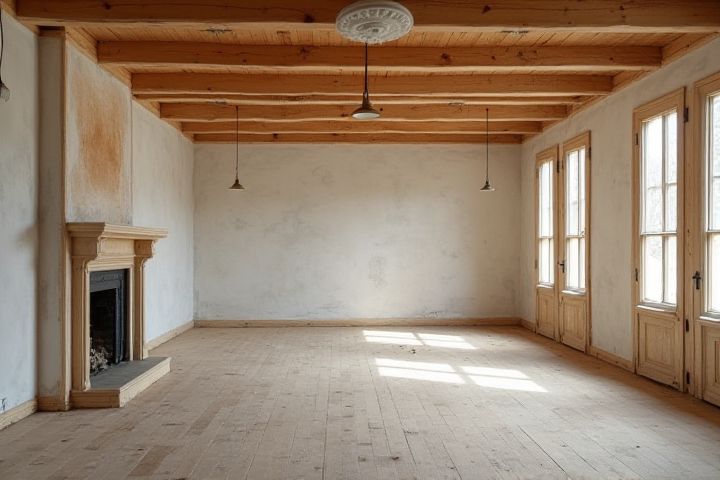
Living in a house during renovations is possible, but it comes with challenges. Consider which areas of the home will be impacted; often, kitchens and bathrooms are focal points that can complicate daily routines. Make adjustments by setting up temporary living spaces, such as utilizing a spare room or creating a makeshift kitchen. It's essential to communicate with contractors about timelines and work schedules to minimize disruption. Be prepared for noise and dust, and establish a clear plan for navigating the renovation safely while ensuring your comfort.
Can You Live In A House While Renovating
Temporary discomfort
Living in a house while renovating can lead to temporary discomfort due to ongoing noise, dust, and limited access to essential areas such as kitchens and bathrooms. Daily routines may be disrupted, requiring you to adapt to makeshift arrangements, which can feel overwhelming. You might face challenges such as inconsistent heating or cooling, as well as potential safety hazards from construction tools and debris. Despite these inconveniences, many homeowners find the end results worthwhile, transforming their spaces into dream homes.
Limited access to certain areas
Living in a house during renovations can be challenging due to limited access to certain areas, especially if the kitchen or bathroom is being remodeled. For instance, if your kitchen undergoes renovation, you may need to rely on a microwave or outdoor grill for meals, impacting daily routines. Depending on the scope of the project, bedrooms may also be out of reach, necessitating adjustments for privacy and comfort. Ensuring effective communication with contractors can help minimize disruptions and keep you informed about which spaces to avoid during the renovation process.
Noise disturbances
Living in a house during renovations can expose you to significant noise disturbances, which can reach levels between 70 to 90 decibels, depending on the tools and activities involved. Tools like jackhammers and power saws contribute to disruptive soundscapes, often starting early in the day and continuing into the evening. Prolonged exposure to these high decibel levels can lead to increased stress and difficulty concentrating, impacting your overall well-being. Having noise-canceling headphones or temporary solutions like white noise machines can mitigate some of the disturbances, helping you maintain a semblance of peace amid the chaos.
Dust and debris management
Living in a house during renovations poses challenges, particularly with dust and debris management, which can significantly affect air quality. Utilizing high-efficiency particulate air (HEPA) filters in your HVAC system and portable air purifiers can reduce airborne particles by up to 99.97%. Employing plastic sheeting to create containment zones around work areas can effectively minimize the spread of debris. Regularly vacuuming with a vacuum equipped with a HEPA filter ensures that dust is promptly removed, helping maintain a healthier living environment.
Safety considerations
Living in a house during renovations requires careful attention to safety considerations. Ensure that all construction zones are clearly marked and access to hazardous areas is restricted, especially for children and pets, to prevent accidents. It's vital to have proper ventilation, as dust and fumes from materials can pose health risks, so consider using air purifiers and sealing off work areas. Additionally, check for potential electrical hazards and ensure all power tools are stored safely when not in use, minimizing the risk of injury.
Utility disruptions
Living in a house during renovations can significantly affect your utilities, particularly electricity, water, and gas. For instance, scheduled outages may occur, leaving you without power for several hours to days. Bathrooms and kitchens could become temporarily unusable due to plumbing work, which might require you to rely on alternate facilities. Planning ahead by notifying utility companies about your renovation can help minimize disruptions and keep your daily routines as uninterrupted as possible.
Flexible scheduling
Living in a house during renovations can be manageable with flexible scheduling. This approach allows you to prioritize essential tasks and minimize disruptions to your daily routine. By strategically planning work on specific areas, such as completing kitchen updates before tackling the bathrooms, you create a more comfortable living environment. Ensuring clear communication with contractors about your schedule also helps in maintaining progress while you continue to reside in your home.
Secure valuables
Living in a house while renovating requires careful planning, especially regarding the protection of your valuables. Consider using secure storage options, like a locked room or a storage unit, to safeguard your most important items during the renovation process. It's advisable to cover furniture and other belongings with tarps or plastic to prevent dust and debris from causing damage. You should also keep an inventory of your valuables to manage their safety effectively and ensure nothing is misplaced or harmed amidst the ongoing work.
Communication with contractors
Living in a house during renovations can be manageable with effective communication with your contractors. Establish clear expectations about timelines, work schedules, and potential disruptions, so you can prepare accordingly. Regular check-ins, at least weekly, can help you stay informed about progress and any unforeseen issues that may arise. By fostering a transparent dialogue, you can ensure that your needs are considered while maintaining a productive work environment for the renovation team.
Alternative living arrangements
Living in a house during renovations can be challenging, but alternative housing options can make the transition smoother. Temporary accommodations such as renting a nearby apartment or staying with friends or family can provide a comfortable environment while the work is underway. You might also consider using a short-term rental service, where furnished homes or apartments are available for weeks to months, offering flexibility and convenience. If necessary, a mobile home or RV on your property can serve as a practical solution, allowing you to maintain close proximity to the renovation process.
